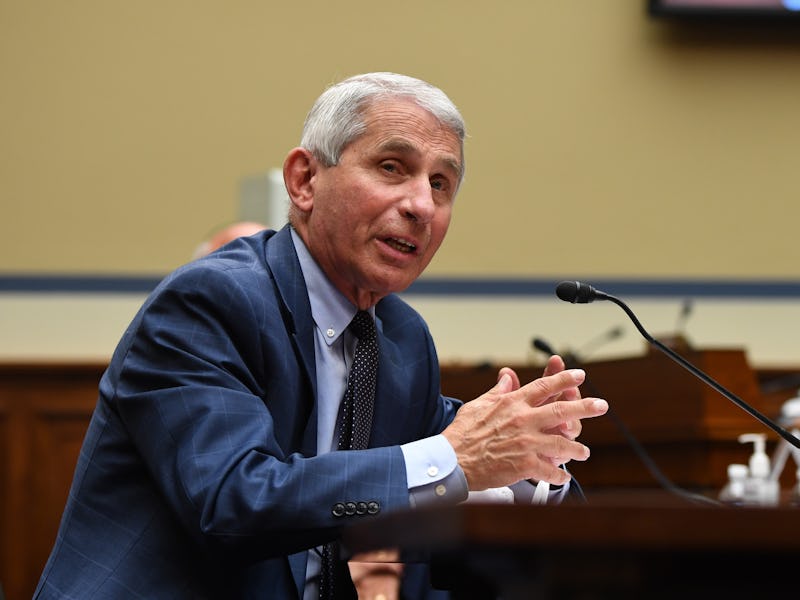Exclusive: Watch Dr. Anthony Fauci explain why contact tracing is so critical
To control the pandemic, contact tracers are essential.

It's been a long coronavirus-filled summer as cases surged, reaching a peak of over 65,000 new cases daily in July. We could all use a pep talk, but one group who especially needs it are contact tracers – the thousands of people who have been calling those newly diagnosed Covid-19 patients every day in hopes of containing the pandemic.
On July 24, one group of contact tracers actually got one from Anthony Fauci, the director of the National Institute of Allergy and Infectious Diseases.
Fauci spoke to the 237-person contact tracing team at the University of San Francisco at the invitation of Michael Reid, the project's leader. Reid's team offered Inverse an exclusive look at Fauci's talk, which you can watch in the video below:
"It’s extraordinarily important to get our arms around this outbreak by doing successful contact tracing," Fauci told the team over Zoom. "Just keep doing what you’re doing and know that a lot of people – people you don’t even know – completely recognize what you’re doing and admire you for it."
Anthony Fauci, the director of the National Institute of Allergy and Infectious Diseases gives a pep talk to a contact tracing team the University of California San Francisco.
Why contact tracers need a pep talk – Contact tracers are tasked with calling as many positive coronavirus patients as possible, as well as the people they may have come into contact with. The hope is they can help those people isolate before new infectious root and spread.
Successful contact tracing helps cut off the chain of transmission, but it's also about supplying people with the resources they need to actually stay at home while the infection persists.
Contact tracing won't end the pandemic, but it is a crucial part of reopening and controlling it. Based on case counts from August 13, Georgetown University's Contact tracing workforce estimator suggests that we need about 337,894 contact tracers to sufficiently reach all positive patients and their contacts. To enter the first stage of reopening, 75 percent of those contacts need to be reached within 24 hours. To live normally, 95 percent must be reached.
Reid told Inverse previously that pursuing that work can push contact tracers to their emotional limits. As cases climb and calls must be made, they risk burning out.
"You’re calling people every day who are full of anxiety," Reid explained. "I don't want to overstate this, but I think many [contact tracers] do experience vicarious trauma from the experience.”
Contact tracers around the country are being trained to fight compassion fatigue, a type of "secondary traumatic stress" that comes from speaking to people who are enduring intense suffering.
What is compassion fatigue? – Compassion fatigue is often documented in psychologists or Intensive Care Unite workers. A 2015 review found that between 7.3 percent and 40 percent of ICU workers experience compassion fatigue.
Because of the Covid-19 pandemic, non-healthcare professionals are starting to feel that stress too, especially contact tracers.
"I don't want to overstate this, but I think many [contact tracers] do experience vicarious trauma from the experience.”
As Fauci notes in his pep talk, many contact tracers aren't "born contact tracers." Reid's team is made up of government workers like city assessors, librarians, and public defenders. The rest are students doing the job for course credit.
A common misconception is that contact tracers are trained to deal with the emotional side of the job over the course of a career. The reality is that many are brought up to speed in a matter of days or weeks. That includes learning to cope with the job's emotional toll.
Darlene Bhavnani is an epidemiologist at Dell Medical School at the University of Texas, Austin. Her team has created their own compassion fatigue program to supplement existing privacy and scientific training that contact tracers require.
"It can be really emotionally draining on our tracers to listen to the stories and then not be able to fully help meet all those needs that go unmet," she told Inverse. "There are some needs that are beyond our control, and it can be difficult and emotionally stressful to listen to that. So we have compassion fatigue training.”
If that doesn't work, there are always words of wisdom from Anthony Fauci to keep spirits up in the meantime.
To find out more about why contact tracers are risking compassion fatigue and burnout at the moment when we need them the most, read the full story here.